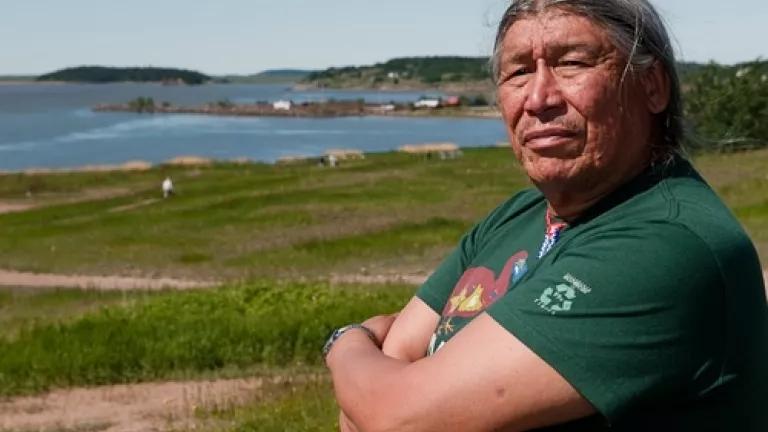
At the Copenhagen climate conference, I had more optimism for international leadership to fight climate change. Here in Cancún, at this international climate conference, I am not as optimistic. I do not see a country stepping up to the plate to take the strong action that we need. And what is more disturbing, Canada is undermining the fight against climate change in order to protect the interests of oil companies investing in tar sands extraction in Canada.
The world and Canada need to understand that the way people live is changing rapidly for the worse due to climate change. Expansion of tar sands will only make climate change worse. What we need is a public inquiry that will examine the pros and cons of tar sands before any more projects. For too long, decisions to allow the tar sands industry to move forward have been in the hands of just a few people, but the results of these decisions are devastating for many.
I come from the north of Canada. My Dene community lives in a river basin that flows into the Arctic Ocean. Where I live, climate change is already happening. Climate change is happening all around me and my people. November 1 of this year, the weather was above freezing. The river was wide open. There should be close to two feet of snow, but even when I left home to come to Cancún, there were only 4 inches. This lack of ice and snow is a burden for people who live off the land. It creates confusion for wildlife. Indigenous Peoples of the north need ice and snow so that we can get around. How do we get to our traplines in the winter if we cannot walk on ice and snow, instead of soft bogs and marshes? For us this is about the loss of our way of life. Warmth in the winter is not a luxury, but a burden that threatens our food security.
Where I live, the continued need of the world for oil is also a burden. My community is downstream from one of the most destructive projects on Earth – mining and drilling Boreal forests and wetlands for tar sands that gets turned into synthetic oil. Tar sands extraction poisons our land, air and waters. It takes water from our river system and leaves us dry. A beautiful river flows by my community, through the Peace-Athabasca Delta which is one of the world’s most important wetlands and a World Heritage Site. Right now the river is at its lowest in the memory of our people. We have never seen the river so low in our lives. This impact on the river is a combination of the oil industry use of the water for tar sands extraction, climate change, and dams up the river. Already, our water is polluted. Even though we are 200 miles from the tar sands, we are put on notice not to eat fish and to be cautious of eating moose meat. The muskrats and the beaver are suffering and we do not find as many as in the past.
The river is life to us. The river is our lifeline, our highway and our spiritual connection to the land. Climate change and the tar sands are destroying this connection.
Canada is doing very little if anything to protect Indigenous Peoples in the face of the tar sands oil industry interests. The Canada that I knew many years ago was a protector of the land and waters. Today, Canada is not doing enough – not for Indigenous Peoples and not for the environment. Canada’s pact with the oil industry is moving it backwards and making the people suffer.
Canada is pushing its pact with the oil industry to the United States and elsewhere in the world. After going to Washington last September, I saw that the American people need to see the big picture of the damage that they are causing by encouraging more tar sands oil extraction with new pipelines such as the proposed Keystone XL tar sands pipeline. And in Canada, Indigenous Peoples are fighting the Enbridge Gateway tar sands pipeline that would cross the Rockies and send tar sands oil overseas through sensitive coastal waters. The impacts of these pipelines show that the destructiveness of tar sands has a long reach: in the place of extraction, downstream in communities such as mine, along pipeline routes, where tankers sail, and in communities around refineries. I ask myself if there is no end to the destruction that Canada and the oil industry are willing to do to get tar sands.
The U.S. State Department is deciding whether to permit the Keystone XL tar sands pipeline. How can a pipeline that will cause even more destructive tar sands extraction be consistent with fighting climate change? How can it be consistent with what the United States says it wants to achieve here in Cancún?
Canada and countries such as the United States that import tar sands need to engage in a public and democratic debate on tar sands and climate change that brings science and traditional knowledge together. Back in the 1970’s Justice Berger organized a panel and inquiry into the proposal for a natural gas pipeline along the MacKenzie River Valley from the Arctic to Alberta. We need something like the Berger inquiry to engage people from all over Canada, the United States, Europe and elsewhere in the world in a discussion about the pros and cons of tar sands development – from extraction to the pipelines and refineries to the end use in cars, trucks and planes. We need our governments to take the time and patience to have such a public discussion and inquiry before any more tar sands development moves forward. Perhaps this will be a way of really dealing with the need to move forward on fighting climate change – through reducing our dependence on dirty fuels such as tar sands.
